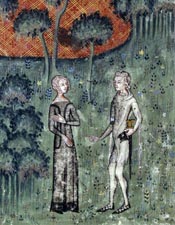The Virelais of Guillaume de Machaut
, translated by Kline, A. S. (contact-email)
Guillaume de Machaut, a pivotal 14th-century French musician-poet, played a key role in the ars nova movement trend and enriched musical forms like the motet, rondel, and ballade. He studied in Reims and served John I of Luxembourg and later the Duc de Berry. From 1337, based in Reims, he centred on writing, composing, and curating his collections. His extensive output encompasses prose, narratives, and works like the Prologue and Le Livre du Voir Dit, which details a potential romance with poet Péronne d’Armentières. He left a lasting legacy on composers and poets like Christine de Pisan and Chaucer. The virelai, termed by Machaut as chansons balladées, along with the ballade and rondeau, were three dominant forms from the 13th to 15th centuries, often set to tunes. Rhyme schemes have been variously altered, to achieve workable verse translations, while retaining the meaning and flavour of the original.

Kline, A. S.
Support Open-Access:
Your contribution keeps our classical translations available to all. Every dollar helps support classics education and funds the expansion of our catalogue. Value what we do? Donate now.
File Downloads:
© Copyright, All Rights Reserved. This work may be freely reproduced, stored and transmitted, electronically or otherwise, for any non-commercial purpose. Conditions and Exceptions apply.